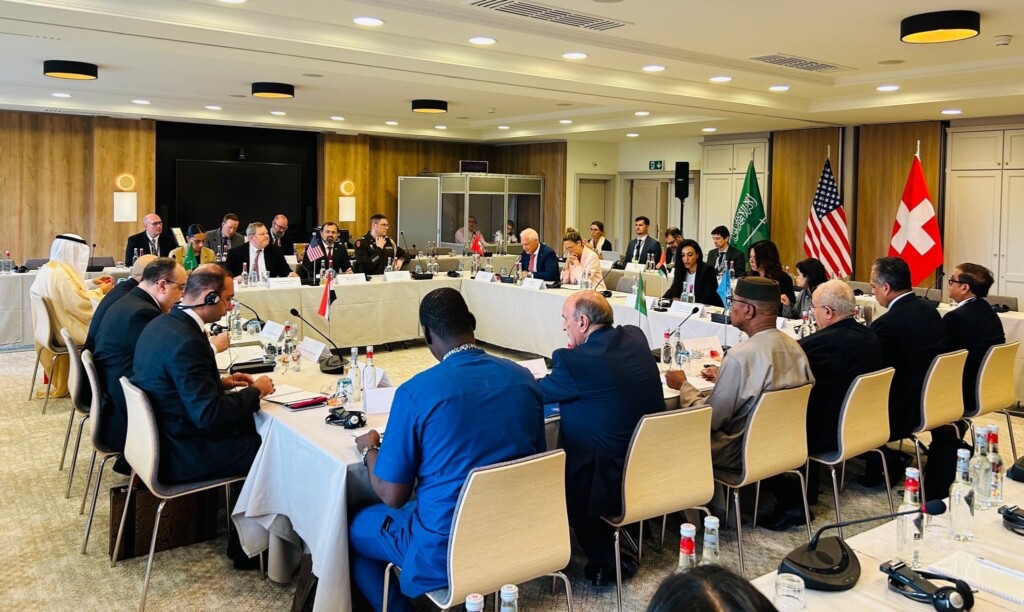Geneva talks pivot to humanitarian aid for Sudan

Delegations from the United Arab Emirates, Saudi Arabia, Egypt, the African Union, and the United Nations (Photo: US Special Envoy for Sudan Tom Perriello via X)
The US Special Envoy to Sudan, Tom Perriello, emphasised the urgent need to address the escalating humanitarian crisis in Sudan, during a press conference in Geneva yesterday. Perriello underscored the priority of delivering food and medical aid to millions of Sudanese civilians, many of whom are on the brink of famine.
Negotiations are still ongoing, Perriello stated, focusing on three key objectives: delivering humanitarian relief, halting hostilities, and building upon the agreements reached in Jeddah earlier this year. However, the immediate challenge, he stressed, is to confront the growing threat of famine in areas such as the Zamzam camp in North Darfur, where over 400,000 people are at risk.
“Our first priority is to open three roads that enable us to deliver relief to more than 20 million people who are now completely or significantly deprived of food and medicine,” Perriello said. He states that over 100 trucks are set to begin moving crucial aid through the Chad-Sudan crossing routes from tomorrow.
Perriello confirmed that negotiations with both the Sudanese Armed Forces (SAF) and the paramilitary Rapid Support Forces (RSF) are ongoing. The US is in direct contact with the military by phone and is holding face-to-face meetings with the RSF delegation in Geneva. These discussions, he noted, are not only focused on ensuring the safe delivery of aid but also on protecting civilians and achieving a ceasefire.
“We negotiate daily with both parties. We will continue to work during the night, not only on the three ways to deliver relief but also on important issues such as the protection of civilians and the cessation of hostilities,” Perriello said.
Tweets
In parallel with the formal negotiations, Perriello has used social media extensively to communicate developments and rally international support. Since August 13, he has been tweeting updates, expressing optimism about the prospects for peace and urging the SAF to join the talks. His social media activity has provided a real-time glimpse into the progress of the negotiations, often reflecting the mood and challenges faced by the negotiating teams.
On the first day of talks, Perriello tweeted about the arrival of the RSF delegation in Switzerland, while noting that the international community was still “waiting for the Sudanese Armed Forces.” His repeated references to the Jeddah agreements have been seen as a strategic move to pressure the Sudanese government into compliance, particularly on issues such as the withdrawal of RSF forces from civilian areas.
The American envoy also welcomed recent developments, such as the Sudanese Sovereignty Council’s decision to open the Adré crossing on the West Darfur-Chadian border. He described this move as “an important step to save lives,” though the RSF later claimed full control of the crossing, downplaying the government’s role.
As the negotiations enter their second week, the pressure on all parties to reach a lasting agreement is mounting. Perriello’s call for the SAF to join the talks has been interpreted by some as an effort to increase public pressure on the government to engage more fully in the peace process.
With the humanitarian situation worsening by the day, the international community is watching closely, hoping that the Geneva talks will lead to tangible progress in a conflict that has already caused immense suffering in Sudan.
‘Building the plane as you fly it’
Cameron Hudson, a senior fellow in the Africa Program at the Center for Strategic and International Studies (CSIS) in Washington D.C., has critiqued the ongoing Geneva talks, describing them as a study in ‘building the plane as you fly it’.
In a tweet posted earlier today on X, Hudson noted that the discussions, initially framed as ceasefire talks, have shifted focus multiple times—first to humanitarian access, then to preliminary talks with the Sudanese Armed Forces (SAF), and are now being referred to as “the current first round of talks.”
He argued that the biggest challenge facing the negotiations is a fundamental lack of understanding by the US of the SAF’s structure, operations, and motivations. Hudson also observed that the language used by US officials suggests they are primarily addressing American audiences, rather than the Sudanese stakeholders involved.











 and then
and then